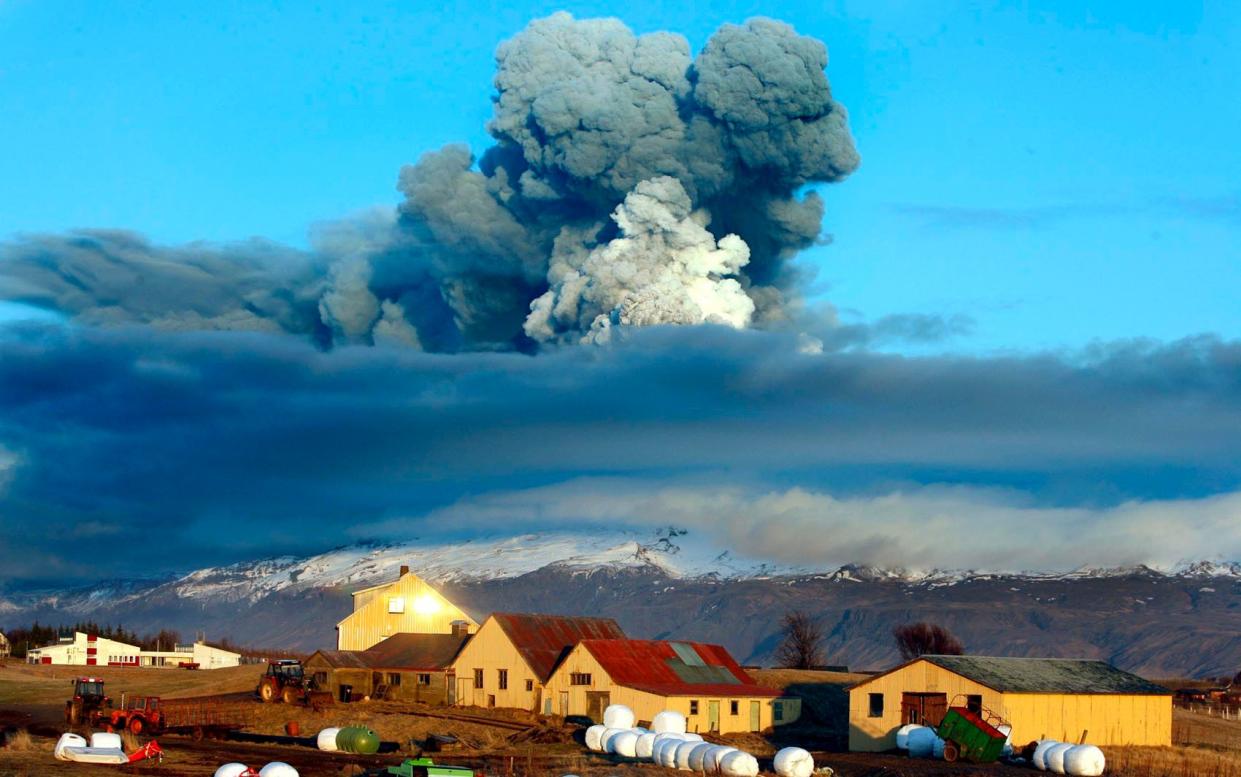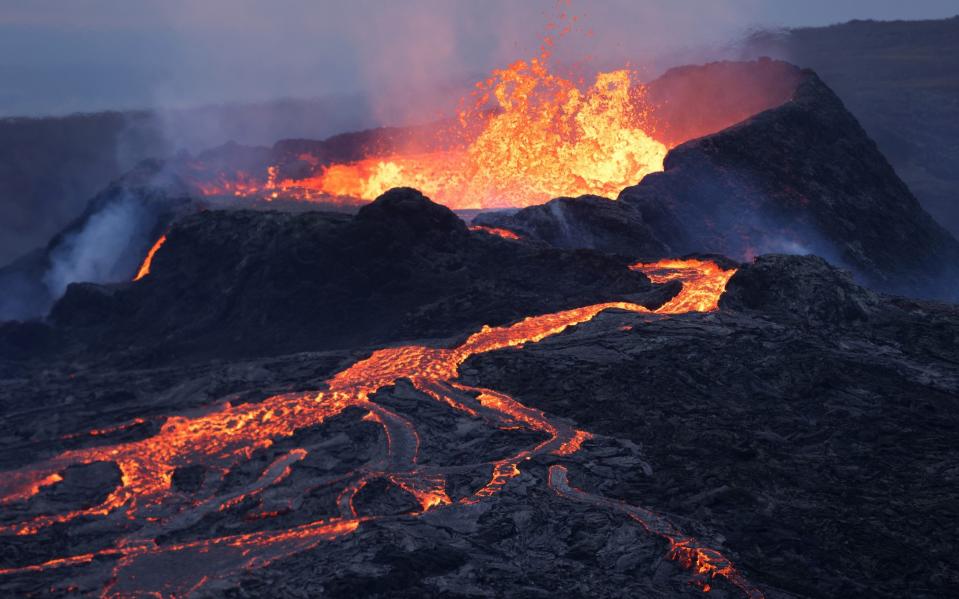Iceland volcano eruption threat fades as Blue Lagoon reopens

Iceland’s most popular tourist attraction has partially reopened to visitors, after over a month of closure amid fears of a local volcanic eruption.
The Blue Lagoon geothermal pool, Blue Cafe, Lava Restaurant, Retreat Spa, Spa Restaurant and the on-site Blue Lagoon Skincare store resumed trading on Sunday, December 17.
The wellness complex in Svartsengi, near Keflavik Airport, had been closed since November 9 due to seismic activity on the Reykjanes peninsula.
The Blue Lagoon’s hotels remain closed, it advised in a statement on December 15. “The current closure for Silica and Retreat hotels and Moss Restaurant will remain in effect until 7:00 on Thursday, December 21 at which point the situation will be reassessed.”
The seismic activity is focused in the Fagradalsfjall volcanic system of the Reykjanes peninsula, in south-west Iceland. Svartsengi, where the Blue Lagoon is located, has experienced extensive earthquakes and land rise in recent weeks.
“Magma flows under Svartsengi and land there continues to rise. What we’re looking at now is a new chapter,” Víðir Reynisson, head of Iceland’s Civil Protection and Emergency Management, told local media last weekend.
“The Icelandic Met Office says that it may be as short as two hours after the first burst of seismic activity and that we can see a volcanic eruption on the surface. It can happen soon, but it can also happen in a long time.”
Blue Lagoon management says the decision to reopen was made “in close collaboration with the authorities”.
“Seismic activity persists in the area, and the Civil Protection’s Alert Phase remains active,” it continues. “Experts are meticulously monitoring the situation with ongoing real-time analysis. Currently, there are no indications of magma approaching the surface.”
Here’s what you need to know if you are booked to travel to Iceland – and your rights if you choose to cancel your trip.

How long will the Iceland volcano risk last?
“There has been some discussion, led by the IMO, about this being part of an uptick in activity that could see decades of increased activity,” says Matthew Watson, Professor of Volcanoes and Climate at the University of Bristol.
“The evidence for this is the fact that there have been multiple eruptions along the same series of fissures in the peninsula in the last few years, and before that an 800 year gap.”
If there is an eruption, it could cause months of disruptions, cautions Professor Watson: “looking at previous eruptions in the region, a single outburst typically lasts weeks to months: this is true of the three most recent eruptions on the peninsula, for example. Some eruptions in Iceland can last longer.”
Residents of nearby town Grindavík were evacuated by Iceland’s Civil Protection Agency in November amid cautions of a “river of magma”, noxious gases and “fire fountains” in the area. The threat was downgraded from “emergency” to “danger”, but locals are currently only able to return home to Grindavík within daylight hours.
The Reykjanes peninsula is a key tourism area of Iceland, home to Keflavik Airport, the nation’s busiest air hub, which is connected to Britain by easyJet, British Airways and other major airlines.
Reykjavik, Iceland’s capital, is located around 50km from the volcanic system.
An eruption would not only spell disruption for holidaymakers booked to travel to Iceland, but there are fears its effects could be more far-reaching. In 2010, the eruption of Eyjafjallajökull volcano in southern Iceland halted commercial flights across Europe for almost a week – leaving 50,000 flights grounded, and an estimated 10 million travellers stranded.
Will the Iceland volcano affect flights – like during the Eyjafjallajökull ash cloud?
The billowing ash cloud of Eyjafjallajökull volcano caused global travel disruption in spring 2010, amid worries that the particles and debris could damage aircraft engines. It lasted for almost a week, causing the highest level of air travel disruption since the Second World War. Could this new wave of seismic activity lead to similar chaos?
No, because any explosion is likely to occur under the ground, not under a glacier, says Paavo Nikkola, Research Scientist at the Geological Survey of Finland GTK.
“A volcanic ash cloud like in 2010 is not possible now,” Nikkola told Finnish broadcast organisation Yle. “Back then, the ash was generated by a large explosive eruption beneath a glacier. Now, the eruption is likely to occur underground. It’s a calm lava eruption that doesn’t produce ash.”
The region has experienced several eruptions in recent years, none of which affected flights, advises a spokesperson from PLAY, a low-cost airline headquartered at Keflavik International Airport. “Iceland is no stranger to volcanic activity, with three eruptions having taken place on the Reykjanes Peninsula in the last two years and no disruption to flights. It has some of the most advanced volcanic preparedness systems in the world to safeguard the public and is well prepared for every eventuality.
“The current seismic activity localised on the Reykjanes Peninsula is being continuously monitored by the Icelandic Meteorological Office, The Department of Civil Protection and Emergency Management, and a team of scientists from the University of Iceland for any changes.”
Are flights to Iceland being cancelled?
“Keflavik International Airport is operating as normal,” the Foreign, Commonwealth & Development Office (FCDO) states in its Iceland travel advice. At present, all flights between Britain and Iceland are unaffected by the volcano.
The likes of Icelandair, easyJet and British Airways connect Keflavik, the nation’s major airline hub, with Britain – and it is a key stopover hub for transatlantic flights. It is the gateway to Reykjavik, the nation’s capital 50 minutes’ drive away.
Airlines are “monitoring the situation closely”, a spokesperson for easyJet disclosed. “Our flying schedule is currently operating as normal however we are monitoring the situation closely and should this change we will contact customers directly to advise on their flights.”
A British Airways spokesperson advised: “Our flights are operating as planned and we continue to monitor the situation closely. We will be in touch with customers directly should the situation change.”
Icelandair, the national airline, has advised it is unable to comment on the situation.
PLAY Airlines has also confirmed that no cancellations or delays have been made to its schedule as a result of the seismic activity. An airline spokesperson added: “[PLAY] is continuously monitoring the situation with the Icelandic government and Meteorological Office and will provide timely updates via email and text with any significant developments that may affect flights.

Is it safe to visit Iceland?
The FCDO has updated its advice for Britons travelling to Iceland. “While there is no current eruption, it is increasingly possible that one could occur,” it now warns.
Those heading to the region should “monitor local media for updates and follow the authorities advice on travel to the area,” it advises.
Travellers should “check for alerts and advice from the: Icelandic Met Office, Safe Travel Iceland, Almannavarnadeild Facebook page and Twitter (@almannavarnir).”
“Earthquakes and indications of volcanic activity have increased above normal levels on the Reykjanes peninsula, southwest of Reykjavik. The Icelandic authorities continue to monitor the area closely, particularly the area northwest of Mt Thorbjörn near the Svartsengi power plant and the Blue Lagoon.”
I’m in Iceland now – can I come home early?
That depends on your airline or tour operator. The FCDO is not currently warning against travel to, or around, Iceland, so your transport provider is not compelled to curtail your trip, nor offer a refund if you choose to head home early. As above, you should monitor the situation via the IMO’s official channels.
If you do change your travel plans, it is likely that you will have to pay for the privilege – though if you have a flexible ticket, the charge may be waived. Speak to your airline or tour operator directly, before you take any decisive action.
Should I cancel my holiday to Iceland?
Unless the FCDO changes its advice to warn against travel to Iceland, or the area to which you are headed, it is likely that your holiday will proceed as planned.
If you choose to cancel your holiday, it is highly unlikely that you will be covered by travel insurance.
Iceland holidays are currently going ahead as normal, says Georgina Hancock, Marketing Director of regional specialist Discover the World. “To date we have had to rearrange a few of our clients’ itineraries who were set to visit the Reykjanes area including the Blue Lagoon. They are all still travelling but will just be visiting other areas in South Iceland.”
An easyJet holidays spokesperson said: “Our holidays are currently going ahead as planned, however we are continuing to very closely monitor the situation and, should anything change, we will be in touch with our customers directly.”
Will I be covered by travel insurance if I visit Iceland?
Yes, while the FCDO does not warn against travel to Iceland. If you are concerned, speak to your provider directly – and ensure that you keep the “emergency” phone number to-hand while abroad, in case the situation changes.
A spokesperson from Regent, a tour operator specialising in Iceland, told Telegraph Travel that tourists are “cautious but optimistic” – and still booking holidays. “Bookings for Iceland are continuing to come through daily. Customers appear to be cautious but optimistic, looking to the FCO and our trusted team for insight. We will continue to monitor the situation and operate accordingly, with the safety of our clients at the heart of every action.
“We are closely monitoring the situation, both by staying in very close contact with our partners on the ground, and using online real time sources like Safe Travel Iceland which has been a useful resource.”
Which tourist attractions have closed in Iceland?
The Blue Lagoon wellness centre has partially reopened. The Blue Lagoon geothermal pool, Blue Cafe, Lava Restaurant, Retreat Spa, Spa Restaurant and the on-site Blue Lagoon Skincare store resumed trading on Sunday, December 17.
However, the Blue Lagoon’s hotels remain closed. “The current closure for Silica and Retreat hotels and Moss Restaurant will remain in effect until 7:00 on Thursday, December 21 at which point the situation will be reassessed,” it advised in a statement on December 15.
The Blue Lagoon is one of the nation’s most popular attractions, visited by millions of tourists every year. “Around 40 per cent of our travellers to Iceland visit the Blue Lagoon,” says Discover the World’s Hancock.
There will be some changes to the Blue Lagoon access and opening hours, its management has warned. “Please note that due to construction for protective walls, only buses are permitted on our site through December 20. We kindly ask guests to reserve transportation with Destination Blue Lagoon.
“At this time, our operating hours will vary slightly from our usual routine, and we’ll be open from 11-20 daily. If you have a booking outside the adjusted opening hours, we kindly ask you to modify your reservation.”

